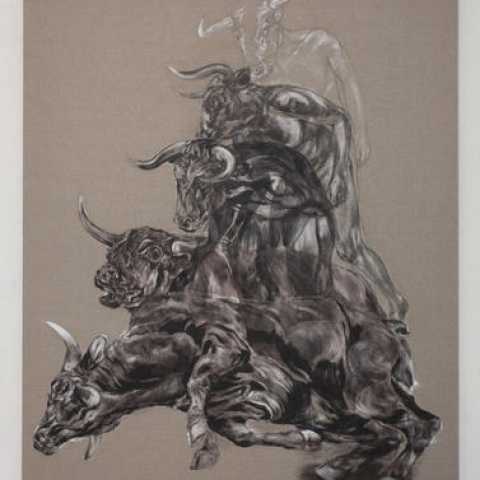Hoxton Gallery
9 Kingsland Road,
London
E2 8DA
United Kingdom

John Simpson is what one would call a master printmaker. He creates incredibly detailed work that examines Man's complex relationship with the natural world. He draws upon classical mythology and folktales with a draughtsmanship of the highest level. His work is striking, unsettling even. John exhibits a proficiency rarely seen these days within a framework of references that have been the canon and source material for many great artists.
The title of this exhibition, 'Dream and Metaphmorphosis' relates directly to Ovid's epic poem, whose first line gives the reader the basis for the work - In nova fert animus mutatas dicere formas/ corpora; ("I intend to speak of forms changed into new entities"). We are in the realm of transfiguration, where people and things are in a state of flux and change. The 'dream' aspect may refer to childhood fantasy and even unconscious desires.
If we take a close look at this series, in 'Liberty of the Minotaur' (oil paint and monotype on linen, a new medium for John, which in turn lends a rawness to the work); we see a sort of reverse transformation, whereby the soft and expertly rendered Minotaur, is graphically and in various stages, turned into a bull. This is quite the different Minotaur, when compared to say Picasso's Bacchic man/bull, given over to wine fuelled carnal pleasures. There is a forlorn look to John's figure, a sad resignation of fate, with Man, a shadowy presence in the background.
In 'Callisto' (who was turned into a bear and set among the stars after she was discovered pregnant), John uses a monotype with woodcut on paper to create a grainy contrast to the fine line drawing of Callisto and the fully drawn bear on her hind legs she becomes. In the 'Metamorphosis - Callisto' (oil and monotype on canvas) we have an anatomical study, the blood red painted heart, fragile in space juxtaposing the magnificent bear. This deep unease of science and industry around animals can also be seen in 'The Booth Child', an ape, whose future is uncertain and precarious.
As Simpson states, ''I don't wish to Anthropomorphise these creatures but rather to reflect on the human position within nature'.
John Simpson's undeniable ablity is to capture the essence of these creatures, their physical and psychological being. The artist's work is technically superb, featuring Classical tales re-examination and reinvented for our era, in which change may not necessarily be a the good thing. This series also delves into our subconscious, exploring fantasy and dreams. This is at times innocent and fun, as in lyrical 'Wildland' piece or elsewhere darker and much more ominous.
Make no mistake about it John Simpson is a serious and distinctly contemporary artist.
John Simpson has exhibited internationally with shows in London, New York, Los Angeles and Sao Paulo. In recent years he has shown alongside modern masters such as Hockney and Warhol.
